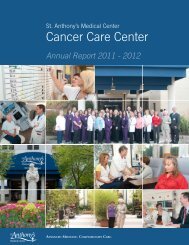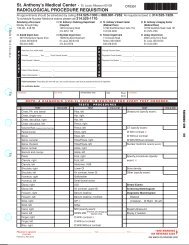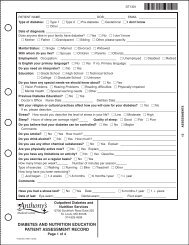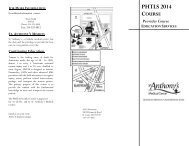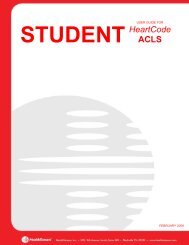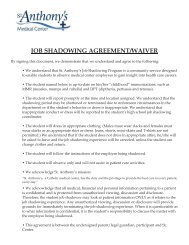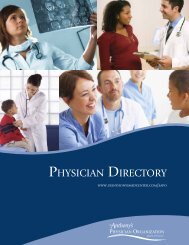Job Shadow Participant Information - St. Anthony's Medical Center
Job Shadow Participant Information - St. Anthony's Medical Center
Job Shadow Participant Information - St. Anthony's Medical Center
Create successful ePaper yourself
Turn your PDF publications into a flip-book with our unique Google optimized e-Paper software.
Patient Needs<br />
Privacy<br />
Every patient has the right, within the law, to every consideration of personal privacy, including<br />
reasonable visual and auditory privacy, with respect to his/her medical care. The patient has the<br />
right to ask that information about his/her presence at <strong>St</strong>. <strong>Anthony's</strong> <strong>Medical</strong> <strong>Center</strong> not be made<br />
available through our information services.<br />
Confidentiality<br />
The patient has the right, within the law, to expect that all communications and records<br />
(electronic as well as written) pertaining to his/her medical and nursing care be confidentially<br />
treated and read only by individuals directly involved in his/her treatment or the monitoring of its<br />
quality. The patient has the right to expect that these records are only read by other individuals<br />
upon his/her written authorization of that of his/her legally authorized representative.<br />
All patient information is confidential. Problems and confidences of patients, and also of coworkers,<br />
should never be mentioned to anyone who does not have a professional right or need to<br />
be told. Gossip about patients, staff members or about the medical center itself, in addition to<br />
being unethical, could result in serious consequences ranging from unpleasantness to court<br />
action. There may be occasions when it would become your duty to report a matter of this nature<br />
to someone in authority, for the sake of someone’s well-being or safety. Report the information<br />
to your immediate supervisor.<br />
Communications in a <strong>Medical</strong> <strong>Center</strong><br />
1. Never discuss patient information in the cafeteria, on elevators or in public.<br />
2. Upon meeting a person, introduce yourself. Tell the patient who you are and why you are<br />
there.<br />
3. Call the patient by name, but do not use the person’s first name unless requested to do so. If<br />
you don’t know the person’s name, you should ask.<br />
4. SMILE! Smiles convey reassurance, friendship, concern, trust, and humor.<br />
5. Look at the person you are talking to. Good eye contact is important in building human<br />
relationships.<br />
6. Good posture tells people that you are alert and ready to help.<br />
7. Remember the words that convey courtesy and respect: “Please.” “Thank you.” “May I”<br />
8. Understand the impact of body language, facial expressions, and tone of voice, all of which<br />
make a big difference in effective communication.<br />
9. Speak clearly and present ideas in a way, which is easily understood.<br />
10. BE AN ACTIVE LISTENER! Give your undivided attention to the person and don’t<br />
interrupt them. Don’t rush. Show your interest.<br />
2




